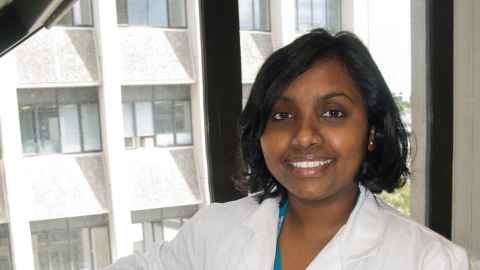Endometriosis: from hysteria to research-based care
17 September 2018
Opinion: Age-old stereotypes about female bodies and suffering are still cheating women of effective, respectful care, writes Anna Ponnampalam.

Back in the suffragettes’ day, it was standard to dismiss female pelvic pain as hysteria. We now understand that diverse conditions can give rise to pelvic pain – from irritable bowel syndrome to endometriosis. Progress has been made in many of these areas. But age-old stereotypes about female bodies and female suffering are still cheating women of effective, respectful care.
Take endometriosis – a condition which involves pieces of the uterus lining lodging and growing outside the uterus. Why does a chronic disease that can cause debilitating pain and infertility, and that affects at least 120,000 New Zealand women and girls, still take on average 8-11 years to diagnose? Partly, because severe period pain is still widely considered “normal”. And because invasive keyhole surgery is the only diagnostic tool, many women put off getting help until the disease is very advanced.
Why does a chronic disease that can cause debilitating pain and infertility, and that affects at least 120,000 New Zealand women and girls, still take on average 8-11 years to diagnose?
Endometriosis has been called the most common disease that no one has heard of. Awareness is patchy and myths abound, even within the health profession. Australia recently launched its first national action plan on endometriosis, which aims to reduce the delay in diagnosis, boost awareness and educate teachers, doctors and employers about the disease.
Historically, it has been difficult to get research funding for this and other gynaecological conditions. I feel privileged to be researching the cause of endometriosis at the Liggins Institute, with the ultimate goal of developing non-invasive diagnostic tests and non-hormonal medical treatments to both prevent and treat it. So far, my co-researcher Professor Cindy Farquhar (FHMS) and I have focused on chemical changes to DNA that may lead the uterus lining to respond abnormally to progesterone.
Demystifying conditions like endometriosis requires collaboration between researchers and the community. This is already happening in the area of nutrition: the Institute partners with schools via LENScience to enable teenagers to explore the impact of nutrition on intergenerational health and wellbeing. The idea is that the teenagers apply the research evidence alongside community and cultural knowledge. Imagine what we could do if adapted this for women’s health?
Senior Research Fellow Dr Anna Ponnampalam is from the Liggins Institute and Faculty of Medical and Health Sciences at the University of Auckland.
This article reflects the opinion of the author and not the views of the University of Auckland.
Originally published in the September 2018 issue of UniNews, which marked 125 years of women's suffrage.